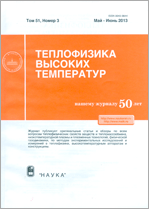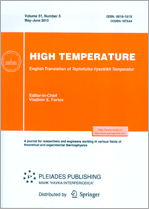|
This article is cited in 4 scientific papers (total in 4 papers)
New Energetics
Modeling of the electrochemical transformation of chemical energy of biofuel to electricity
A. Z. Zhuk, P. P. Ivanov, E. A. Kiseleva
Joint Institute for High Temperatures, Russian Academy of Sciences, Moscow
Abstract:
A thermodynamic model is proposed for the electrochemical process of the conversion of the chemical energy of biofuels into electricity in a fuel cell of direct carbon oxidation. It is shown that, with the use of polarization resistance from the experiment, a current density of $0.1$–$0.5$ A/cm$^2$ provides a power-plant efficiency in the range of $87$–$55\%$. At an operating temperature of $1073$ K, carbon is oxidized mainly to monoxide, which is why the initial portion of the fuel cell is actually a gasifier, and the rest is a conventional solid oxide synthesis gas fuel cell. In the gasification section, the electrochemical process proceeds with heat absorption and has an ideal thermal efficiency above unity. It is advisable to separate these two sections constructively to optimize the heat transfer between them.
Received: 07.02.2019
Revised: 07.02.2019
Accepted: 22.10.2019
Citation:
A. Z. Zhuk, P. P. Ivanov, E. A. Kiseleva, “Modeling of the electrochemical transformation of chemical energy of biofuel to electricity”, TVT, 58:2 (2020), 300–305; High Temperature, 58:2 (2020), 292–296
Linking options:
https://www.mathnet.ru/eng/tvt11185 https://www.mathnet.ru/eng/tvt/v58/i2/p300
|


| Statistics & downloads: |
| Abstract page: | 112 | | Full-text PDF : | 70 |
|





 Contact us:
Contact us: Terms of Use
Terms of Use
 Registration to the website
Registration to the website Logotypes
Logotypes








 Citation in format
Citation in format 
